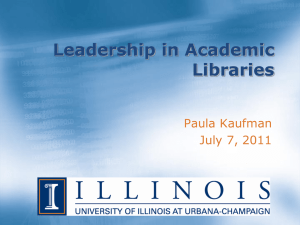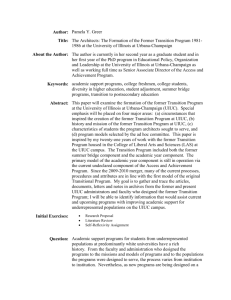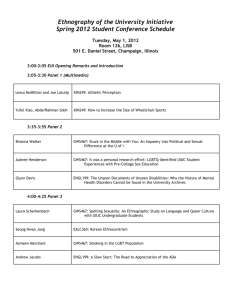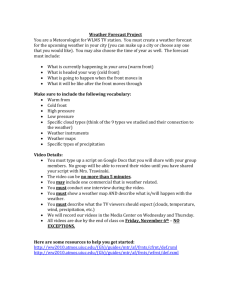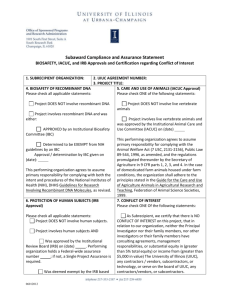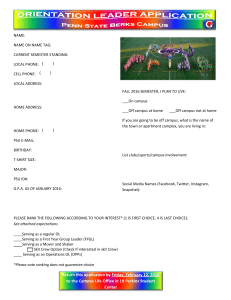race and religion
advertisement
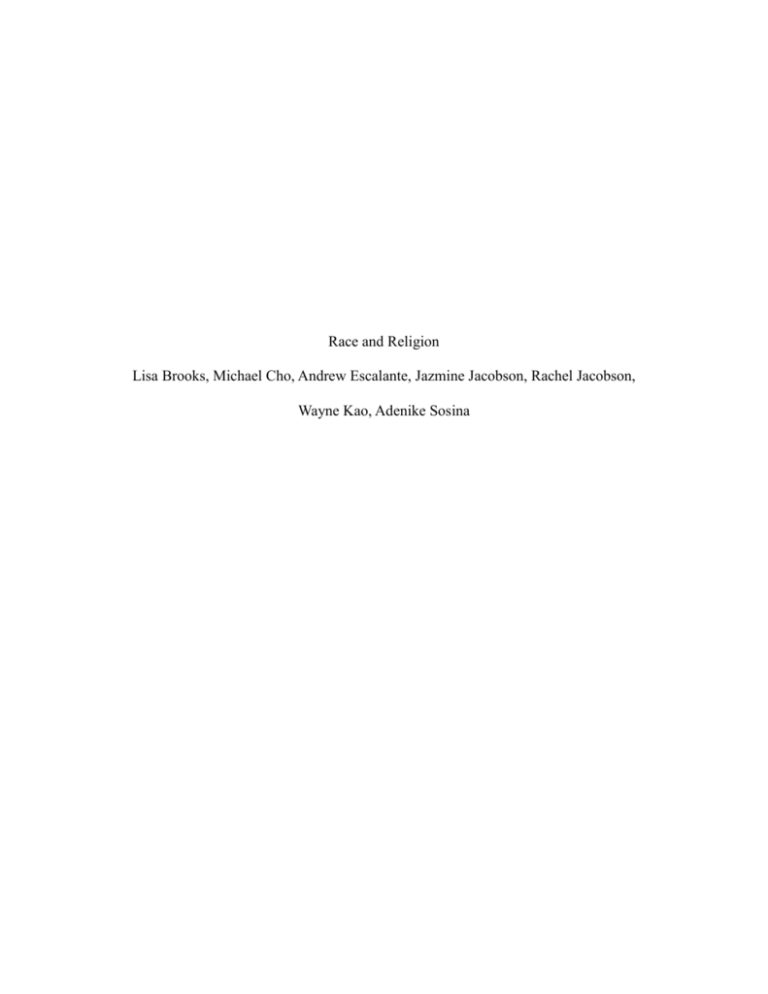
Race and Religion Lisa Brooks, Michael Cho, Andrew Escalante, Jazmine Jacobson, Rachel Jacobson, Wayne Kao, Adenike Sosina 1 Abstract Religion and race seem to strongly impact the lives and decisions of the students at the University of Illinois Urbana-Champaign (UIUC). As a group of freshman students, we explored the impact race and religion has on students’ decisions to join organizations, Greek life, and clubs. We additionally explored the impact it had on their decision to apply to UIUC. In addition to these factors, we explored students’ ethnicities and religions in order to best understand the students surveyed. We surveyed students to see if they had been predisposed prior to joining a club, organization, or Greek life, thus altering their decision and opinion. How do parents and family influence students’ decisions? Parents and family appeared to greatly impact many students, driving them to accomplish their tasks and become involved on campus. This difficult study peaked our interest because oftentimes assertions don’t ensure correct perceptions. Methodologies Our data involved current students and organizations at UIUC. Thus, we gathered our information on currently enrolled students (freshman through seniors) and their involvement in active clubs, activities, and organizations offered at Illinois. In order to conduct this study, our group chose to pass out surveys at random to a diverse group of students on campus. To further enrich our data, research will be supported with the opinions and information stated in academic journals and articles. Through our surveys, we explored a series of questions. We explored students’ background by addressing their age, year in college, hometown, type of high school they attended, and current place of residence. We then proceeded to explore personal information such as, what 2 race/ethnicity are your parents? What race/ethnicity do you most closely identify yourself with? What religion (if any) does your family practice? Are you religious? If so, what religion do you practice? The survey continued by asking students to rate the importance of each question on a scale ranging from one to five; least to greatest importance. The questions in this category included, how important is your religion to you? How firm is your belief in your religion? How strictly do you follow your religion? How greatly does religion influence your daily decisions? How greatly did religion impact your decision to attend UIUC? The last part of the survey addressed students’ involvement with clubs and organizations on campus, and specifically: asked what impact did “your” religion have on “your” decision to join? The final question asked students’ if they had a predisposition towards given clubs and organizations on campus. Hypothesis Prior to our research, our group had the inclination that religion greatly impacted students’ decisions to join given clubs and organizations on campus. Our group came to the consensus that students, like us, especially during a period of adjustment were more inclined to join organizations with students’ similar to themselves. In our group, many of us took this into account before joining our respective organizations and clubs. Thus, we predicted our own conclusions based on previous assumptions. We assumed religion is a major influence on students’ decisions to participate in academic and extracurricular activities at the UIUC. We observed during formal recruitment on campus that students’ of given religions were more likely to join certain Greek houses on campus. Numerous clubs, activities, and groups have been established at UIUC to provide a religious outlet for students (see fig. 1). 3 Volunteer Groups Fig. 1. Clubs/Sports/Greek Life Fellowship or Religion based club at UIUC Club Sport 9.1% Greek 20% 11% 5.70% 28.60% Academia 5.70% No Participation Other Other 20% We were under the assumption that religion often served as the main influence in students’ desire to take part in a specific organization. The goal of our study was to prove if our assumptions were accurate. According to Bowman, “College students’ spiritual development constitutes an important, yet understudied topic in higher education research” (Bowman and Small, 2010). Nickolas Bowman and Jenny Small (2010) suggest that, “Although it has received relatively little attention in the higher education literature, spiritual development may constitute one of the most important outcomes of the college experience.” Although Bowman and Small believe clubs are affiliated with a public institution, the authors discovered they are often disengaged from the overall academic curriculum. Clubs are typically being disengaged from curricular education. Bowman and Small discuss that 4 clubs are still culturally and religiously based to fulfill the needs of practicing students while receiving an education at UIUC. They provide students an outlook, and different educational experience from those they receive in the classroom. However, through our research, we have discovered religion has little impact on a students’ decision to join a club or organization. We perceived that students may be predisposed to join clubs, specifically fraternities and sororities because their parents were once members, or through previous assumptions of other students. The Jewish sorority Alpha Epsilon Phi (2010) was founded on October 24, 1909 at Barnard College in New York- a period when anti-Semitism was common. The goal of the sorority was to provide Jewish women a place of comfort. Alpha Epsilon Phi has chapters located across the country. (Alpha Epsilon Phi Official Website, 2010). According to an interview with an anonymous Christian member, the interviewee believes, “Alpha Epsilon Phi is a place I feel comfortable. By being a part of a sorority that practices a different religion from my own, I have been able to learn about other cultures as well as develop strong friendships.” In addition to religion, we assumed that race plays a prominent role in determining extracurricular participation among students. We assumed there is a notion on campus that only certain women of given religions and races can pledge specific sorority houses. In “Sorority Row” (2002), written by Jason Zengerle, Zengerle explains the story of Christina Houston, an African American student at the University of Alabama in the early 2000s. Houston, a sophomore, was eager to join a traditionally populated white sorority in order to expand her cultural horizons. Although Houston is half African American, she 5 is light skinned, and thus appeared white to the other girls. Gamma Phi Beta, a traditionally white house, accidently admitted Christina into their chapter. The members of Gamma Phi Beta were unaware of her parents’ races; her mother is white while her father is black. The active members were not in favor of having a black woman in their sorority. However in 2001, Christina became the first black woman to be a part of a typically white sorority at the University of Alabama (Zengerle, 2002). As Houston stated, ‘“I never saw it as an issue of Black rush or White rush; it was just rush.” Although the University of Alabama Greek life made strides in regards to integration, the following year an African American girl was not offered a bid due to her skin color. Houston fortunately felt comfortable in her environment; however the university Greek life did not make noticeable strides due to her membership. The same year the African American girl was not given a bid, Houston transferred from the university due to homesickness and deactivated from Gamma Phi Beta. According to the Senate President of the University of Alabama's Faculty Senate, Norm Baldwin, Baldwin supports the Senates resolution to punish Greek fraternities and sororities who do not accept black members. Baldwin states, “We are concerned with the structures, policies, and practices.” The same stereotypes associated with sorority rush are prevalent at UIUC. With numerous cultures and ethnicities, race at UIUC is diverse (see fig. 2), but it has not always been so. In the 1960’s, an organization named Project 500 was created to address racial inequality, specifically among the African American race. “Although the first African American student, William Walter Smith, had graduated from the University of Illinois in 1900, African American students were rare, and they faced considerable barriers in their 6 efforts to gain a college degree” (Cathy Prendergast et al. UIUC). The goal of the project was to enroll 500 African American students into the university to increase the percentage of the present and also an effort to serve all citizens equally. In 1967, only about 1% of the student body was African American, a figure that had remained constant for decades” (Cathy Prendergast et al. UIUC). In addition, we assumed that male students would face the same religious dilemma when choosing to join a fraternity. “Faith and Frats Boys” explores the topic of religion and how it can affect college life, specifically fraternities, at Indiana University. (Chu, 2005) The article questions the importance of religion to students and whether or not one can be a member of a fraternity and still be religious. The article questions righteousness and how one’s religion can affect the decisions he or she makes. Being religious in college can be difficult, as well as staying strong to one’s faith. “Can they be both a brother in Christ and a brother in a frat? Or should they live only with other believers? How do they deal with stereotypes of Christianity that others may hold? And what does it mean to live out their faith on a secular campus like Indiana's?”(Chu, 2005) In addition, we want to discover how race and religion affect a student’s decision to apply to UIUC. According to Klein in, “Lawmakers Debate Wis. Admissions”, the University of Wisconsin was no longer interested in reviewing each application individually in order to learn more about each student’s cultural background, experiences, and race. After reviewing the case, the result was declared by state legislators that the university must review each applicant holistically. A holistic review includes “examining his or her socioeconomic status, membership in any historically underrepresented racial or ethnic group, and evidence of leadership and/or community service, as well as his or 7 her academic record” (Klein, 2007). This case has relevance to the students at UIUC because the University of Wisconsin-Madison is also a Big Ten university. When choosing to apply to UIUC and the University of Wisconsin-Madison, students need to keep in mind that the admission office may use their religion and/or race to determine their acceptance. Results The first factor we measured in our surveys was ethnicity (see fig. 2). Half of the students surveyed were Caucasian. Fig. 2. Race and Ethnicity at UIUC 6% Caucasian Asian 18% 49% Middle Eastern 6% African American 3% Hispanic 18% Italian We also surveyed Asian, Middle Eastern, African American, Hispanic, and Italian. Most of the students surveyed lived in our current dorms, but many of the surveys were random. One-sixth of our surveys were distributed to a sorority house. Our surveys also contained questions that enabled us to find the percentage of students that practiced a religion different than their family (see fig. 3). 8 Fig. 3. Religion at UIUC 11.50% Orthodox Christian Catholic 3.80% 11.50% 30.80% 26.90% 15.40% Within our sub-categories dealing with specific religions, 27 percent of our interviewees practiced Christianity, 31 percent Catholicism, and 42 percent no religion/other. From our data we conclude that the highest number of students, followed by Catholicism, practiced no religion. 77 percent of students surveyed additionally practiced the same religion as their family. We also gathered the results of campus extracurricular involvement of the students surveyed (see fig. 1.) The largest percentages, 28.6 percent of the students were involved in a club sport. Following this statistic, 20 percent were involved in an academic club or did not participate in clubs or organization at all. This may be largely linked with the percentage of students interviewed that were freshman. Most of the students interviewed were freshman, as most of the students surveyed were from our housing. The other activities the students’ surveyed were involved in were volunteer groups (11 9 percent), fellowship or religion based club (5.7 percent), Greek life (5.7 percent), and other (8.6 percent). As mentioned in “Faith and Frat Boys” and from the data gathered, we conclude that religion does not play that large of a role in students’ lives when it comes to making decisions for clubs and Greek life. Our group was surprised by these values as well because we thought more students were involved with outside activities. Many of our group members are involved with one or more of these activities. Thus, we assumed that more students were involved in extracurricular activities on campus than our results showed. However, our sample of about 100 students (see further research) might not be large enough to gather accurate data of the entire student body. (UIUC Students Surveyed, 2010). As the survey progressed, our questions became more specific. We asked the students to rank (one to five, five being the highest) the following categories in regard to race and religion. Our average values were slightly lower in given areas than we anticipated. In the categories, how important religion and race were to students ranked a 3.15, how strictly they follow their religion (2.8), the daily influence of their religion (3.0), their decision to attend UIUC (1.7), adequate resources provided on campus in regard to race and religion (3.9), and impact race and religion has on joining clubs (1.6). Clearly, the student body believes that UIUC provides the resources for them to practice their religion and learn about their race, but does not utilize these facilities frequently. Religion, in particular, seems to be a secondary concern to students. We then proceeded to ask students how their approach to religion has changed since they have arrived at UIUC (figure 2.) The greatest percentage of students, 60, believes that their religious 10 beliefs have stayed consistent since they have arrived on campus. Twenty percent of students are advantageous and are interested in learning more about their religion as well as becoming involved. A small percentage, eight, said they no longer attend church anymore. Ten percent also said they are less committed and involved. A lower percentage, two, said they want to practice their religion more frequently, however the lack the time limits their efforts. In our final category, predisposition, a large percentage of students, 56, said they had no religious or racial predispositions before joining Greek life, clubs, or organizations. Research affected 28 percent of students’ predispositions in these categories. Twelve percent were predisposed by their personal opinion and four percent were predisposed by their family. After reviewing the surveys, many of the students who were predisposed by their family to join specific Greek houses, clubs, or organizations were also involved in Greek life. Thus, we may be able to form the conclusion that the students’ family members were also involved in Greek life, therefore predisposing their perception of given chapters. The average value of religious influence a student’s decision to attend UIUC is 1.7, 34 percent. The data leads us to conclude that religion is not as an important factor as we assumed. Conclusions Our group found it particularly fascinating that in regard to our data as a whole, religion seems to bare little significance in the daily lives of the student body. Although the campus provides the adequate means to offer facilities, services, and information in regards to race and religion, students seem to be uninvolved or uninterested in this area. If the general consensus is that religious beliefs are very important to students, then it 11 makes sense that it received only a slightly lower score, a 3.0, in the category of daily influence. On the contrary, considering the amount of students that do not practice any religion, we would expect religion’s daily influence on students’ decisions to be lower than a three out of five. The highest score from any of the categories is a 3.9 in UIUC having adequate resources for students’ religious needs. Thus, our data demonstrates juxtaposing factors. Why are the students who feel religion is so important and believe the university has adequate resources to fit their religious needs less involved and no longer attending church? (see further research) In an overwhelming number of cases, students rated religious importance a five, but influence on daily decisions at a one or two. In twenty percent of the cases, students who ranked religious importance at a four or above also said that they no longer attended church and have made no advances in furthering their faith. The majority of students (seventy-seven percent) continued to practice the same religion as their families while at UIUC. Given the information about the majority of students continuing to follow the same religion as their parents, we could assume that the daily decisions of these students’ parents have affected theirs as well, thus enabling us to conclude why many joined the same fraternity/sorority as their parents. In regards to students’ decisions, parental influence on religion plays a great role. Thus this statistic demonstrates students are becoming more independent from the religion in which they were raised. In regards to the information provided previously, we would expect that the majority of the clubs and organizations students are involved in would be unaffiliated 12 with specific religions. In fact, there was a relatively high correlation among these ideas. There was less than a six percent student involvement in fellowship or religion based clubs and organizations. Overall, students are not very affected by religion while at UIUC. Clearly, religion plays a very insignificant role in the average student’s life. Thus, we can conclude religion does not really affect student’s daily lives at UIUC. Regardless if a student is religious or not, there seems to be hardly any influence on joining clubs/organizations/Greek life. Due to this lack of influence and presence of many adequate resources, this information proves UIUC is independent from religion. Thus, religion is becoming less of a factor in students’ daily lives. Although the impact of religion on applying to UIUC is relatively low, students applying to the university need to be aware that the admissions office takes these factors into account when admitting students. Our group was surprised by this result. We believed that the university housed many students with similar backgrounds, race, and religious beliefs. It was vital in our decision making process that UIUC possessed a diverse student body. It is interesting how our perception of ourselves, and the student body was not reflected in the data. Further Research Based on the conclusions reached in our data, we are able to suggest relevant ideas leading to further evaluation of our data. We can further question why it appears that individuals fear straying from their comfort zone, thus only joining clubs, organizations, and Greek life that is strictly affiliated with their religion and race. It can be questioned 13 whether or not these students find it beneficial branching out and meeting new students of various cultures and ethnicities. We are curious if this information allows students to better understand themselves, and their religion. We inquire whether or not our data will lead us to determining what organizations on campus appeal to the student body and which ones (religiously affiliated or not) do not. Are some people more inclined to step out of their comfort zones than others? Moreover, does race affect where a student sits in their dorm cafeteria? However, students often adapt to their new environments. Does a language and culture barrier limit foreign students from attempting to join organizations or simply living on campus? We predict the more comfortable one is with members of another race or religion the more likely they are to respect and learn about the given culture. We are also curious as to how our sample size impacted our results. Would our results be the same if we surveyed 1000 students? We additionally are interested in regards to students who value religion what specific factors limit students’ from taking advantage of religious resources at UIUC. 14 Appendix Clubs/Sports/Greek Life at UIUC Volunteer Groups Religion Based Club Club Sport Greek Life Academia 11% 5.70% 28.60% 5.70% 20% Figure 4 Race and Ethnicity at UIUC Caucasian Asian Middle Eastern African American Hispanic Italian 49% 18% 3% 6% 18% 6% Figure 5 Religion at UIUC Orthodox Christian Catholic Non-Denominational Christian Not Religious Not Religious, but believe in God Atheist 11.50% 30.80% 15.40% 26.90% 11.50% 3.80% Figure 6 15 References AEPhi. Web. 15 Nov. 2010. <http://www.aephi.org/>. Banks, Adelle M. "High Court rules against Christian club on campus." Christian Century 127.15 (2010): 16. Academic Search Premier. EBSCO. Web. 15 Nov. 2010. "Black Student Gets Bid to White Sorority at University of Alabama." Higher Education News and Jobs. 2005. Web. 01 Dec. 2010. <http://diverseeducation.com>. "Biracial Woman Says She Broke Sorority Race Barrier At Alabama University." Find Articles at BNET | News Articles, Magazine Back Issues & Reference Articles on All Topics. Johnson Publishing Co., 24 Sept. 2001. Web. 15 Nov. 2010. <http://findarticles.com/>. Bowman, Nicholas and Jenny Small. "Do College Students Who Identify with a Privileged Religion Experience Greater Spiritual Development? Exploring Individual and Institutional Dynamics." Research in Higher Education 51.7 (2010): 595-614. Academic Search Premier. EBSCO. Web. 3 Oct. 2010. Chu, Jaff. "Faith and Frat Boys." Time 165.19 (2005): 48-50. Academic Search Premier. EBSCO. Web. 27 Sept. 2010. Fischer, Mary J. "Does Campus Diversity Promote Friendship Diversity? A Look at Interracial Friendships in College." Social Science Quarterly (Blackwell Publishing Limited) 89.3 (2008): 631-655. Academic Search Premier. EBSCO. Web. 3 Oct. 2010. Klein, Alyson. "Lawmakers Debate Wis. Admissions." Education Week 26.27 16 (2007): 16. Academic Search Premier. EBSCO. Web. 15 Nov. 2010. Smith, Brian C. "Out of Your Comfort Zone: Is Your God Too Nice?" Library Journal 131.13 (2006): 94. Academic Search Premier. EBSCO. Web. 15 Nov. 2010. "University of Alabama Greek system remains segregated" Find Articles at BNET | News Articles, Magazine Back Issues & Reference Articles on All Topics. Johnson Publishing Co., 24 Sept. 2001. Web. 15 Nov. 2010. <http://findarticles.com/>. Zengerle, Jason. "Sorority Row." New Republic. Vol. 226. Tuscaloosa, 2002. 19-23. EBSCO. Web. 27 Sept. 2010.
